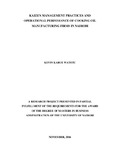| dc.description.abstract | The study sought to establish the extent to which Kaizen is implemented and its effects on operational performance of cooking oil manufacturing firms in Kenya. This study also aimed at assessing the relationship between Kaizen management practices on the operational performance of cooking oil manufacturing firms in Nairobi Kenya. This study employed a descriptive research design. All the cooking oil manufacturing firms based in Nairobi have implemented all or at least one Kaizen Management Practice in their operations. The study utilized primary data due to its efficient, flexible, accurate and inexpensive nature. The data was collected through the use of questionnaires. As such a total 54 possible respondents was drawn purposively from the nine (9) cooking oil manufacturing firms. The data collected was purely quantitative and it was analyzed by descriptive analysis. The descriptive statistical tools such as Statistical Package for Social Sciences (SPSS) and MS Excel helped the researcher to describe the data and determine the extent used. Data analysis used frequencies, percentages, means and other central tendencies. The findings were presented using tables and charts. In addition, regression analysis was conducted. The study found that majority of the organisations had implemented Total Quality Management. Kaizen management practices affect the operational performance of cooking oil manufacturing firms. Just-In-Time (JIT) affects quality management of cooking oil manufacturing firms in Kenya. Just-In-Time (JIT), Suggestion System, Kaizen Events, Total Productive Management (TPM) and Total Quality Management (TQM) affect cost efficiency of the cooking oil manufacturing firms in Kenya. Total Productive Management (TPM) affects delivery time of cooking oil manufacturing firms in Kenya. As a result of implementation of Kaizen manufacturing practices, the firms realized improved product quality, exceeded customer expectations, speed time-to-marker, reduced lead time and cut operation costs. In order to ensure that Kaizen improvement outcome remain effective in operational performance, the management of the firms should procure employees that are competent with right qualifications to manage Kaizen practices. The execution ought to be in accordance with the corporate vision, mission, values and policies. The main focus of the study was the cooking oil manufacturing firms that are in Nairobi County and its environs hence further research could widen their scope beyond Nairobi to cover the whole country. | en_US |



